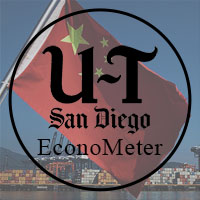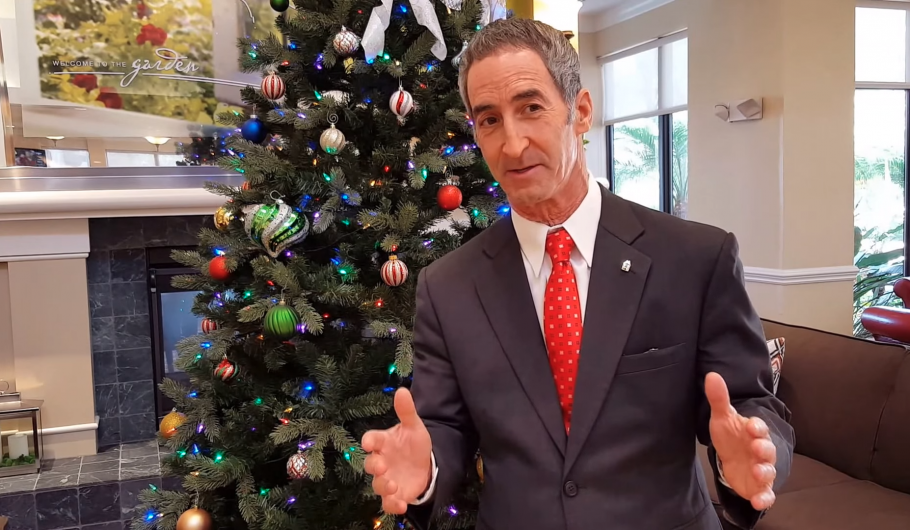California’s gyrating budget: Tax reforms ahead?
EconoMeter looks at alternatives to smooth out revenues in good times and bad
from San Diego Union Tribune’s EconoMeter panel.
Q: Are there any tax reforms that could stabilize California’s budget receipts?
Bob’s Answer: Yes.
We must simplify the tax code, reduce regulations and lower tax rates in California until we have cut waste and have a sustainable revenue stream that is protected during economic downturns.
The tax code must become more business friendly to attract companies and we must move toward merit pay for teachers, pension reform and lower government spending. Further, we must create incentives for companies to operate here and create more jobs.
Read more answers here.
L.A. Chargers: A good economic bet, despite risks?
EconoMeter looks at alternatives to smooth out revenues in good times and bad
from San Diego Union Tribune’s EconoMeter panel.
Q: Are financial rewards of moving to Los Angeles worth the risks to the Chargers?
Bob’s Answer: No.
This is a small town team with owners who are better suited to San Diego.
Los Angeles will have a larger market for personal seat licenses but the valuations are in a bubble due to television dollars that will be dramatically reduced when technology allows people to watch games from anywhere. If they lose on the field, the risks increase.
Their best bet is to leverage the Rams and NFL and come back home.
Read more answers here.
If China’s economy tanks, does California’s soar?
EconoMeter weighs the relative impact of a Chinese downturn
from San Diego Union Tribune’s EconoMeter panel.
Q: Would the California economy benefit by a sagging China economy?
Bob’s Answer: No.
California is a leader of the global economy and a sagging Chinese economy will inevitably be a drag on California and the world. That is not to say that there will not be bright spots.
We hoteliers benefit from continued outward travel of Chinese tourists and the state does not rely heavily on Chinese imports.
California’s economy has proven its resiliency time and again so no matter what happens, the Golden State will continue to shine.
Read more answers here.
Revenue Management Key to Hotel Success
By Carrie Rossenfeld
Originally posted on GlobeSt.com
SAN DIEGO—Accurately projecting room demand based on history and local activity is one way hotel owners and operators can stay ahead of the curve no matter what economic events may transpire, RAR Hospitality’s CEO Bob Rauch tells GlobeSt.com. We spoke with Rauch exclusively about the hotel market and what owners and operators can do to ensure success in 2016.
GlobeSt.com: With the current real estate cycle looking to end in the not-too-distant future, what can those in the hotel industry do to stay ahead of the curve?
Rauch: There are several areas where we can stay ahead of the curve. One is understanding revenue management thoroughly. We must accurately project room demand based on history and local activity, including, but not limited to, area booking pace, competitive rates and type of business. With that information, one can begin to move business from expensive channels like OTAs to direct channels. Further, understanding how long it takes to book that less-expensive business and whether or not that business might potentially be repeat business further enhances the likelihood of successful revenue generation. Lastly, holding rates up instead of “dropping our drawers” at the first sign of a slowdown.
It has been proven by Cornell’s Hotel program and STR that this is a bad strategy.
On the cost side, constantly evaluating wage scales and staffing needs, forcing all department heads to bid all vendors annually, using zero-based budgeting and eliminating what I refer to as the “C” team will dramatically reduce cost and improve morale.
The “A” team are the up-and-comers or stars. The “B” team are solid role players and the “C” team are expendable, but were hired based on immediate need.
GlobeSt.com: What are the greatest threats to the hotel industry currently?
Rauch: The greatest threats are new supply, the sharing economy and the impact of Airbnb in particular, interest rate increases, oil price increases, terrorism or perceived risks that reduce visa issuance, global economic stability and economic growth that is reduced after this election year. North Korea is another threat—when there is instability in both the Middle East and Asia, there are more chances for disruption. Claiming to test a hydrogen bomb is not something the US will or should take lightly.
GlobeSt.com: Where do the greatest opportunities lie in the hotel industry?
Rauch: Our opportunities are the continued need for lodging despite all warnings that videoconferencing would reduce demand (first mentioned in industry publications in 1982 and repeated frequently for two decades), as well as the yet-untapped growth in international travel. While listed as a threat above, Airbnb provides the lodging industry with the opportunity to embrace and adapt to the sharing economy by changing the offerings for guests to accommodate the needs of today’s travelers. Lodging is a noble profession that will grow due to the need for groups to meet face to face, salespeople to sell face to face and the perception by Americans and others in free nations that travel is a birthright.
GlobeSt.com: What else should our readers know about this sector?
Rauch: The lodging sector is cyclical like others, but is much more scientific now than ever before. Algorithms are sophisticated for revenue management, distribution channels are limitless, sharing economy entities have become mainstream and the competitors include apartment complexes, cruise ships, timeshares and more. Based on this, the cap rates are always higher for hotels than other asset classes, the vulnerabilities are real and the need for intense day-to-day management leaves many real estate investors on the industry sidelines.
Predictions 2016: Valley learns to live luxuriously and eat sloppy with new hotels, restaurants
By
I’ve only been with the Phoenix Business Journal for about four months now, but I’d like to think I have an inkling as to what will happen in the hospitality/tourism and retail/restaurant industries in 2016.
My predecessors preferred to make predictions in fairly broad strokes, and while the following predictions are more or less in the same vein, I’ve made an attempt to be a little more specific and daring about what’s going to happen in the new year.
New hotels to open, existing ones to renovate
One of the first interviews I had was with RAR Hospitality CEO and PresidentBob Rauch. During the meeting, he made sure to tell me Phoenix is the largest growing city in the hospitality industry.
Rauch was right. Just within the past few months, new hotels have opened or announced they will open. Those properties include the Hilton Garden Inn Phoenix Downtown, the future Andaz Resort & Spa Scottsdale and the futureParadise Valley Ritz-Carlton, just to name a few.
At the same time, existing hotels such as the Hotel Valley Ho, the Four Points by Sheraton Phoenix North Hotel and the Radisson Phoenix North, among others, have undergone millions of dollars worth of major renovations. That doesn’t begin to include the impact of the major hotel merger between Starwood Hotelsand Marriott International.
With the influx of college bowl games and playoffs, the NCAA championship, and the golf and spa lifestyle that out-of-towners gab about, it is more likely hotels will continue to either improve or open throughout the Valley, namely in the West Valley, downtown Phoenix and Scottsdale.
The East Valley hasn’t seen as much action as the rest of Phoenix with hotels, but that could always change.
EconoMeter predictions for 2016
from San Diego Union Tribune’s EconoMeter panel.
Q: What one economic indicator will you be focusing on most in 2016?
Bob’s Answer: Purchasing managers
The economic indicator I will be watching in 2016 is the survey by the Institute for Supply Management (ISM). This survey of purchasing managers comes out the first business day of each month and represents the most influential statistic released by the private sector.
Inside the ISM report, 20 different business sectors are probed for strength and weakness.
There is too much politics in government released data despite the importance of jobs, CPI, GDP, etc.
Hospitality Sector Adjusts to Stay Ahead of Possible Changes
San Diego — In 2016, San Diego County’s hospitality industry — including operators of 7,000 restaurants and hundreds of hotels — will be looking for a continuation of what has generally been a strong-performing local economy during the past three…
The economy in retrospect: Surprises in 2016?
And how did panelists’ predictions pan out for the year?
online pharmacy buy flexeril with best prices today in the USA
from San Diego Union Tribune’s EconoMeter panel.
Q: What was the most surprising economic news in 2015?
Bob’s Answer: Oil glut
There was an expectation that oil prices would rise and settle in the $60-$70 per barrel (range) by year-end but supply continued to increase while global demand abated. My very close seconds was climate change being heralded as the greatest threat to mankind ahead of destroying ISIS, choking Iran with sanctions, securing the border, trillion of debt and over 100 million living on federal welfare.














